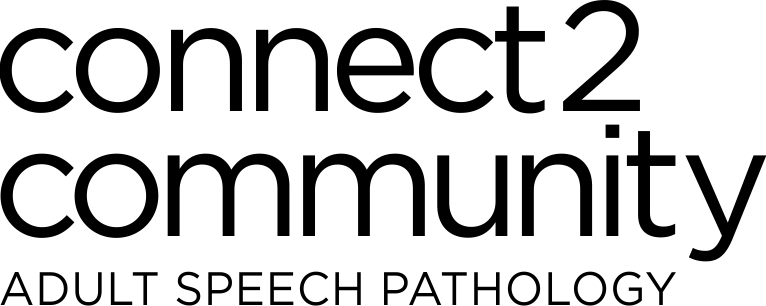SERVICES
connect2community proudly services the Brisbane and Ipswich regions.
We provide mobile services for those in rural, regional, and remote areas (up to 100km from the central office in Chapel Hill, Brisbane).
connect2community provides quality care and therapy sessions to all other serviced areas via telehealth.
Home-based therapy
We provide clients access to therapy in an environment in which they feel most comfortable. Your home is the best environment to create functional and meaningful therapeutic activities relevant to your everyday life.
Community-based therapy
The goal of community-based therapy is to help the client generalise their targeted skills in a real-world setting where it is required – such as at work, university, and in social settings.
Telehealth therapy
We recognise the potential for high-quality speech pathology telehealth service for people living in rural, regional, and remote areas of Australia. Telehealth is also offered as an alternative service delivery for all clients who wish to receive speech pathology services in their home environment.
We support equitable access to our speech pathology service for all individuals to improve quality of life.
ADULT SPEECH PATHOLOGY
At connect2community we offer the following areas of support
Assessment of communication and swallowing conditions
Collaborative goal-setting and meaningful real-life outcomes
Individual therapy programs
Group therapy programs
Staff education and training
Education of the public regarding speech pathology services
Advocacy for individuals, families, and communities to ensure communication access
COMMUNICATION MATTERS
Communication plays a vital role in human life. It is the basis of all human interaction. It is how we pass information onto others and how we receive and interpret what is said back to us. When you consider the importance of communication, losing the ability to communicate can have a significant impact on a person’s life.
When we talk about communication we are talking about a broad range of activity. Communication involves speaking, listening, and understanding. It’s being able to read and write and being able to use and understand nonverbal communication in the form of gesture and facial expression, tone of voice and body posture.
Communication also has a functional purpose. If we take a moment to reflect on why we communicate, we can very quickly appreciate communication is the primary means by which humans share their thoughts and feelings, express their identity, build relationships, pass on traditions, conduct business, teach and learn. Communication is a basic human right. Speech pathologists play a crucial role in enabling people with communication impairment to realise their communication rights.
Communication impairment is more common than you think. The impact can range from mild to severe, with difficulties that can be temporary or last a lifetime. There is a high correlation between communication difficulties and poor mental health. Communication difficulties can impact on interactions at home, at work and socially.
There is no-one-size-fits all approach to communication management. At connect2community we consider the client at the centre of treatment planning. The management plan is guided by you (the client), your goals, and evidence-based practice. At connect2 community we work with you (the client) and your significant others to foster and facilitate the sending and receiving of your message whilst establishing and maintaining your social links with others.
Speech pathologists are trained to assess and diagnose, provide treatment and advocate for people with a communication disorder. Please contact connect2community speech pathology if you have any concerns or questions regarding communication or a recent diagnosis of a communication disorder.
Speech Pathology Australia, (2019). Factsheet-Communication Impairment in Australia. Melbourne.

SWALLOWING MATTERS
Like breathing, swallowing is a reflex and essential to everyday life. Humans swallow on average between 500-700 times a day: during sleep, whilst awake and even more during meals. We swallow food, liquids, medicine and saliva.
Eating and drinking is an important part of everyday life. Not only is eating and drinking important for our nutrition and ability to sustain life, but eating and drinking is also an important pastime, and many social activities happen around eating and drinking.
As easy as it might seem, swallowing is one of the most complicated actions carried out by our bodies. Swallowing involves a series of actions that occur in a precise and orchestrated sequence. Swallowing uses 26 muscles and many nerves to coordinate the split-second timing needed to safely swallow. Mistimed movements can lead to food or drink ‘going down the wrong way’.
Swallowing difficulty is called dysphagia. Dysphagia is any problem with swallowing, drinking, chewing, eating, controlling saliva, taking medication and protecting the lungs from food and drink ‘going down the wrong way’. Dysphagia can cause a range of medical and psychosocial issues for the person and their family/friends.
There is no-one-size-fits all approach to dysphagia management. At connect2community we consider the client at the centre of treatment planning. The management plan is guided by you (the client), your goals, and evidence-based practice. At connect2 community we work with you (the client) and your significant others to optimise your swallowing function and your capability (i.e., build your knowledge, skills and ability) to participate in your tailored swallowing management plan, and within your mealtime environment.
Speech pathologists are trained to assess and diagnose, provide treatment and advocate for people with dysphagia. Please contact connect2community speech pathology if you have any concerns or questions regarding dysphagia or a recent diagnosis of dysphagia.
Speech Pathology Australia, (2019). Factsheet-Swallowing. Melbourne.
Quality service, innovation and continual pursuit of knowledge
Every client and every community deserves the highest quality speech pathology service. To ensure connect2community continues to provide the best quality services for their clients and community we stay informed of evidence-based practice innovations and advances in the field of speech pathology practice, and in other fields relevant to speech pathology practice.
At connect2community we demonstrate a high level of skill and professionalism and compliance with rigorous quality and ethical standards.
We are forward thinking with an innovative outlook. We seek out current knowledge and technologies with the goal to improving client outcomes in communication, swallowing and community connections.
We are skilled and resourced to provide speech pathology services respectful of each person’s culture, language, life experiences and preferences.
Telehealth model of care
At connect2community we recognise the growing body of evidence to support the standard use of telehealth to enhance speech pathology service delivery. Telehealth uses live video (i.e., video-calling) on your computer, tablet or smart phone to deliver speech pathology services at a distance by linking the speech pathologist to the service user (e.g., client, family member) for the purpose of assessment and/or therapy.
We are committed to providing equitable and accessible speech pathology services to those living in rural, remote and regional areas of Australia. Telehealth is also offered as an alternative service delivery for all clients who wish to receive speech pathology services in their home environment. A flexible care approach is also provided whereby a client can attend a combination of in-person and telehealth sessions for their speech pathology management.
At connect2community you will be well supported with clear instructions to access your telehealth appointment.
“Humans cannot live or thrive in isolation. We are inherently social. As such, communication is essential to our humanity. It is important to our expression and self-determination as individuals, our sense of belonging within a community, our inclusion and participation within society, and in acknowledging the meaning and value of ourselves and others”
McEwin & Santow (2018, p.1)
McEwin, A., & Santow, E. (2018). The importance of the human right to communication. International Journal of Speech-Language Pathology, 20(1), 1-2.


